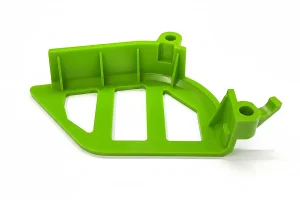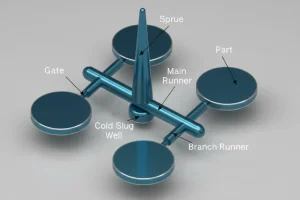Introduction
Industry 4.0 has rapidly emerged as an transformative concept, revolutionizing manufacturing sectors worldwide. This concept refers to the incorporation of advanced digital technologies and automation into traditional manufacturing processes for increased efficiency, productivity, and flexibility – among them injection molding as a major beneficiary.
Injection molding is a widely utilized manufacturing technique in which plastic material, typically molten, is injected into molds to create desired shapes. It plays an essential role in various industries including automotive, consumer goods, medical devices and packaging; its implementation under Industry 4.0 could significantly enhance efficiency and quality production while leading to greater market competitiveness.
By adhering to Industry 4.0 principles, injection molding companies can use technologies such as the Internet of Things (IoT), artificial intelligence (AI), data analytics and automation to optimize processes and make data-driven decisions. By employing advanced technologies like these, manufacturers are able to enhance connectivity, automate operations, monitor real-time data streams and ultimately enhance overall performance of injection molding processes.
In the following sections, this article will delve further into the key principles and applications of Industry 4.0 for injection molding processes, including connectivity, automation, data integration and other related technologies. By understanding and applying these principles to their injection molding operations, manufacturers can unlock its full potential – driving them toward increased efficiency and quality levels in production processes.

II. The Importance of Industry 4.0 in Injection Molding process parameters
Industry 4.0 brings a host of benefits and advancements to the manufacturing landscape, and injection molding stands to gain significantly from its implementation. Let’s explore the importance of Industry 4.0 in injection molding and how this manufacturing technique can leverage the associated technologies.
Efficiency and Productivity:
Industry 4.0 technologies offer automation and real-time data analysis capabilities, allowing injection molding processes to operate with enhanced efficiency. Connected injection molding machines, equipped with sensors and IoT devices, can collect and transmit data on key process parameters such as temperature, pressure, and cycle times. Manufacturers can analyze this data to identify optimization opportunities, reduce downtime, and maximize production output.

Quality Control:
Injection molding processes require stringent quality control measures to ensure the production of high-quality parts. Industry 4.0 introduces advanced data analytics, machine learning algorithms, and real-time monitoring, enabling manufacturers to detect and address quality issues in real-time. By continuously monitoring variables such as temperature, pressure, and material consistency, deviations can be identified promptly, minimizing defects and scrap rates.
Predictive Maintenance:
Unplanned equipment downtime can significantly impact production schedules and profitability. With Industry 4.0, injection molding machines can be equipped with sensors that monitor machine health and performance indicators in real-time. By leveraging predictive analytics and machine learning models, manufacturers can detect potential equipment failures in advance and schedule maintenance proactively, reducing costly unplanned downtime.
Flexibility and Customization:
Industry 4.0 technologies empower injection molding processes with greater flexibility and customization capabilities. Through digital twin technology, virtual replicas of molds and machines can be created, allowing for simulation and optimization before physical production. This enables manufacturers to iterate and customize designs quickly, reducing time-to-market and meeting individual customer requirements effectively.

Data-Driven Decision Making:
The integration of Industry 4.0 technologies in injection molding generates vast amounts of data. By harnessing this data through advanced analytics, manufacturers can gain valuable insights into their processes, identify patterns, and make data-driven decisions. This empowers them to optimize process parameters, minimize waste, and achieve continuous improvement in their operations.
In conclusion, Industry 4.0 offers substantial benefits to injection molding, revolutionizing the way manufacturers approach efficiency, quality control, predictive maintenance, flexibility, and decision-making. By embracing and leveraging these technologies, injection molding processes can become more efficient, cost-effective, and adaptable, positioning manufacturers for success in the evolving manufacturing landscape.
III. Key Principles of Implementing Industry 4.0 in Injection Molding
A. Connectivity and Data Integration
In implementing Industry 4.0 in injection molding, connectivity and data integration play a vital role. The Internet of Things (IoT) and cloud computing enable real-time data collection and analysis. Injection molding machines, sensors, and relevant equipment can be connected to a network, allowing for seamless communication and data sharing. This connectivity facilitates the collection of critical process data, such as temperature, pressure, and cycle times, enabling real-time monitoring and analysis. By harnessing this data, manufacturers can gain insights, optimize process parameters, and make data-driven decisions to enhance efficiency and quality in injection molding.

B. Automation and Robotics
Automation and robotics are key components of Industry 4.0 in injection molding, driving improvements in efficiency and productivity. Automated systems can be employed in various stages of the injection molding process, including material handling, mold changeovers, and quality control. Automated material handling systems ensure smooth and efficient movement of raw materials, reducing manual labor and minimizing errors. Automated injection mold and changeover processes reduce downtime between production runs, allowing for faster transitions and increased production efficiency. Additionally, robotics can be utilized in quality control, employing vision systems and AI algorithms for precise inspection, defect detection, and sorting of injection molded parts. By implementing automation and robotics, manufacturers can achieve higher throughput, improved process consistency, and enhanced productivity.
C. Predictive Maintenance
Predictive maintenance is a crucial aspect of Industry 4.0 in injection molding. By integrating sensors, a machine control system, learning models, and data analysis, manufacturers can predict equipment failures and optimize maintenance schedules. Sensors monitor machine health, collecting data on parameters such as temperature, vibration, and energy consumption. Machine learning algorithms analyze this data, detecting patterns and identifying potential issues before they lead to breakdowns. Predictive maintenance enables proactive maintenance actions, minimizing unplanned downtime, extending equipment lifespan, and optimizing maintenance costs. By implementing predictive maintenance strategies, manufacturers can ensure the availability and reliability of their injection molding machines, improving overall operational efficiency.
D. Digital Twin Technology
Digital twin technology offers significant benefits in the implementation of Industry 4.0 in injection molding. It involves creating virtual replicas, or digital twins, of injection molding machines and molds. These digital twins enable manufacturers to simulate and optimize production processes in a virtual environment. By inputting real-time data and running simulations, manufacturers can evaluate the impact of various process parameters, such as temperature, pressure, and cooling times, before making physical changes to the actual production setup. This virtual testing minimizes trial and error, reduces downtime, and improves process optimization. Digital twin technology allows manufacturers to optimize their injection molding process, enhance product quality, and accelerate time-to-market.
By implementing the key principles of connectivity and big data, integration, automation and robotics, predictive maintenance, and digital twin technology, manufacturers can unlock the full potential of Industry 4.0 in injection molding. These principles enable improved process control, enhanced productivity, reduced downtime, and higher-quality output, leading to competitive advantages in the dynamic manufacturing landscape.
IV. Applications of Industry 4.0 in Injection Molding process
Industry 4.0 offers injection molding manufacturers many advantages for optimizing operations and reaching higher levels of efficiency, productivity, and quality. Let’s examine its main applications in injection molding process while emphasizing smart manufacturing, predictive maintenance, quality control and optimization as part of Industry 4.0’s value proposition.
smart manufacturing processing parameters
Through connectivity, data analytics, and automation manufacturers can build smart factories that optimize production processes. IoT sensors collect real-time information regarding machine parameters, environmental conditions and material characteristics which is then analyzed using advanced analytics enabling manufacturers to monitor and optimize injection molding in real time resulting in increased equipment utilization, reduced downtime and overall improved efficiency of injection molding process.

Predictive Maintenance:
Industry 4.0 in injection molding includes predictive maintenance as an important application. By leveraging sensor data for analysis of equipment performance and early identification of any potential failures before they happen. Machine learning algorithms and predictive analytics models help detect patterns or anomalies within data which enables accurate prediction of maintenance needs. With predictive maintenance strategies in place, manufacturers can schedule maintenance activities proactively reducing unplanned downtime while increasing equipment availability.
Quality Control:
Industry 4.0 technologies significantly enhance quality control in injection molding. Real-time monitoring and data analytics enable manufacturers to detect and prevent quality issues during the production process. Machine vision systems and AI algorithms can be employed to inspect and analyze the surface quality, dimensional accuracy, and structural integrity of injection molded parts. By integrating these technologies, manufacturers can identify defects, ensure compliance with specifications, and reduce scrap rates. Real-time quality control enhances product consistency, customer satisfaction, and brand reputation.
Optimization of Process Parameters:
Industry 4.0 facilitates the optimization of process parameters in injection molding. By leveraging digital twin technology and simulation tools, manufacturers can virtually test and optimize process settings before implementation. This allows for efficient process parameter optimization, such as temperature profiles, injection speeds, and cooling times. By simulating and analyzing different scenarios, manufacturers can minimize trial and error, optimize cycle times, and achieve the desired product quality. Process parameter optimization results in improved productivity, reduced costs, and enhanced overall process stability.
By applying the principles of smart manufacturing, predictive maintenance, quality control, and optimization, plastic injection molding process can harness the full potential of Industry 4.0. These applications enable manufacturers to streamline operations, improve product quality, reduce costs, and respond quickly to market demands. Embracing Industry 4.0 in injection molding ensures manufacturers remain competitive in the ever-evolving manufacturing landscape.
V. Improving the Quality of Injection Molding through Industry 4.0
Quality control is a critical aspect of injection molding, and Industry 4.0 principles offer advanced techniques to enhance quality control in this manufacturing process. Let’s explore how Industry 4.0 enhances quality control in injection molding and the techniques involved, such as data analytics, machine learning, and statistical analysis.

Real-Time Monitoring and Data Analytics:
Industry 4.0 enables real-time monitoring of key process parameters during injection molding. Through the integration of sensors and data collection systems, manufacturers can continuously monitor variables such as temperature, pressure, and cycle times. This real-time data is then analyzed using data analytics techniques, including statistical analysis, to detect anomalies and deviations from the desired process conditions. Real-time monitoring and data analytics allow for proactive identification of potential quality issues, enabling immediate corrective actions to be taken, thus reducing defects and scrap rates.
Machine Learning and Predictive Analytics:
Machine learning techniques play a significant role in quality control within Industry 4.0. Machine learning algorithms can be trained using historical data to identify patterns and correlations between process parameters and product quality. By analyzing these patterns, the algorithms can predict the quality of injection molded parts based on real-time process data. This enables manufacturers to detect potential defects or deviations in quality early on, enabling proactive measures to be taken to maintain product consistency and reduce waste.

Statistical Analysis and Process Optimization:
Industry 4.0 principles leverage statistical analysis to identify trends, patterns, and root causes of quality issues in injection molding. By conducting statistical analyses on historical and real-time data, manufacturers can gain insights into the relationships between process parameters and product quality. This information can be used to optimize process parameters, such as temperature profiles, injection speeds, and cooling times, to achieve the desired quality outcomes. Statistical analysis also helps in identifying and minimizing sources of variation, leading to improved process stability and consistent product quality.

Quality Inspection and Defect Detection:
Industry 4.0 technologies enable advanced quality inspection and defect detection techniques in plastic injection molding. Machine vision systems can be integrated into the manufacturing process to capture high-resolution images of injection molded parts. These images can then be analyzed using image processing algorithms and machine learning models to detect defects, such as surface imperfections, dimensional variations, or structural abnormalities. By automating the inspection process, manufacturers can achieve higher accuracy, reduce human error, and ensure consistent and reliable quality control.
By incorporating data analytics, machine learning, statistical analysis, and advanced inspection techniques, Industry 4.0 enhances quality control in injection molding. Real-time monitoring, predictive analytics, and optimized process parameters lead to reduced defects, improved product consistency, and higher customer satisfaction. Embracing the principles of Industry 4.0 empowers manufacturers to deliver high-quality injection molded parts, maintain a competitive edge, and meet the stringent quality standards of today’s market.

Conclusion
In conclusion, the implementation of Industry 4.0 in injection molding brings a multitude of benefits and opportunities for manufacturers. By leveraging the principles of connectivity, automation, data integration, and digital twin technology, injection molding processes can achieve significant improvements in efficiency, productivity, and quality control.
Through connectivity and data integration, manufacturers can collect and analyze real-time data on process parameters, enabling them to make data-driven decisions and optimize production processes. Automation and robotics enhance efficiency by reducing manual labor, improving process control, and ensuring consistent production. Predictive maintenance strategies enable manufacturers to proactively identify and address equipment issues, minimizing downtime and optimizing maintenance schedules.
Digital twin technology allows for virtual testing and optimization of production processes, reducing trial and error and accelerating time-to-market. The application of Industry 4.0 principles in plastic injection molding also leads to enhanced quality control through real-time monitoring, data analytics, machine learning, and statistical analysis. Manufacturers can detect and address quality issues promptly, ensuring product consistency and reducing defects.
Embracing Industry 4.0 is crucial for manufacturers seeking a competitive advantage in the injection molding industry. By adopting these advanced technologies and practices, manufacturers can achieve higher production efficiency, improved product quality, reduced costs, and increased customer satisfaction. Embracing the transformative power of Industry 4.0 allows manufacturers to stay ahead in a rapidly evolving manufacturing landscape.
In conclusion, the plastic injection molding industry stands to gain significant benefits from implementing Industry 4.0. By embracing connectivity, automation, data integration, and digital twin technology, manufacturers can optimize their processes and achieve a competitive edge in terms of efficiency, quality, and customer satisfaction. The journey towards Industry 4.0 in injection molding is essential for manufacturers to thrive in the evolving manufacturing landscape and meet the demands of the modern market.










